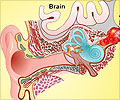Anti-depressant paroxetine could be effective for tinnitus patients suffering from anxiety and depression, a Japanese study has found.
Anti-depressant paroxetine could be effective for tinnitus patients suffering from anxiety and depression, a Japanese study has found.
Fifty-six tinnitus Japanese sufferers who had been treated solely with paroxetine were assessed retrospectively for the severity, loudness and annoyance of their tinnitus, and for anxiety and depression. They were also given standard hearing tests by Dr Naoki Oishi and colleagues at the Keio University School of Medicine in Tokyo.Results at a six-month follow up assessment by showed that in the group of patients with both anxiety and depression in addition to tinnitus, paroxetine significantly reduced the effects of tinnitus on all measures.
Patients with tinnitus and anxiety but no depression reported that their tinnitus was less severe and annoying and their anxiety levels were significantly reduced, however there was no effect on tinnitus loudness. A third group with neither anxiety nor depression showed an improvement in the severity of their tinnitus, but not on its loudness and annoyance.
About a third of the patients in the study stopped taking paroxetine before the end of 6-months for various reasons, such as their tinnitus improving or for health reasons unrelated to the drug.
There are currently no universally effective drug treatments for tinnitus, and previous research on paroxetine – one of the drugs known as selective serotonin reuptake inhibitors, or SSRIs – found that the drug was no more effective than taking a placebo at treating tinnitus. However, paroxetine is approved for treating anxiety as well as depression conducted the present study to find out whether paroxetine could be effective for tinnitus sufferers with both depression and anxiety.
Dr Oishi said “We wanted to know whether this affected the result we saw but it turned out that both short-term and longer-term treatment patients with tinnitus, anxiety and depression got better. The long-term group had the most benefit, however, so it may be that longer-term treatment is needed for the drug to be maximally effective.”
Advertisement
The results may help doctors to design more effective treatment programmes for the patients who are most likely to benefit, says Deafness Research,UK.
Advertisement
GPL/S














